Well, if this won’t get me into hot water, nothing will. But, things being what they are this year in the USA, I think it needs to be talked about.
So right here at the beginning, let me be clear: I am giving pastoral advice. I am not trying to score political points. I will try to avoid most of my usual attempts at humor, since I know how easy it is to offend or confuse people in these matters. If you think I say anything out of line, please add a comment below. OK?
How to consider politics as an Orthodox Christian
1. Try to think “outside the box”.
This point is based not on the Orthodox Faith, but on common sense – which certainly is a gift of God. Political categories and definitions and parties keep changing. I’ve been around long enough to see this. Some things, both far left and far right, that were considered off the wall sixty years ago are now generally acceptable. Some things on both sides which then were normal are now thought by many to be unacceptable. When I was young there were many Republican liberals, many Democratic conservatives. Sixty years ago the word “socialism” meant one thing. Now many use it differently. Point made? I’m just saying that this happens. It always has. So (says the old man): Pay attention. Don’t just go along with the flow of pop politics. Think.
A wise Episcopal priest once suggested to me that politics should be thought of  not as a bird – left “wing”, right “wing” – odd imagery, if you stop to think about it! – but rather as a circle, and that when the far right and far left meet at the other side of the circle, they are very similar. Case in point, he said: Communism (far left) and Nazism (far right) both allowed little individual freedom, suppressed free expression, had almost total government control, much propaganda and demagoguery, etc. He said both were very different from free democracy on the other side of the circle. Consider this. I don’t know that we need to accept all the labels to the right. The point here is only that there are other ways to picture politics. So again… Think.
not as a bird – left “wing”, right “wing” – odd imagery, if you stop to think about it! – but rather as a circle, and that when the far right and far left meet at the other side of the circle, they are very similar. Case in point, he said: Communism (far left) and Nazism (far right) both allowed little individual freedom, suppressed free expression, had almost total government control, much propaganda and demagoguery, etc. He said both were very different from free democracy on the other side of the circle. Consider this. I don’t know that we need to accept all the labels to the right. The point here is only that there are other ways to picture politics. So again… Think.
2. Orthodoxy takes us above the box.
Secular political and social theory limits itself to a flat surface: right and left, circle, whatever. But Orthodoxy comes from above, the Kingdom on high. Politics is of human origin. Jesus Christ is God Incarnate, and His teachings are divine revelation – as recorded in the Scriptures and elucidated by the Fathers. Christ intends us to be “in the world but not of it.”John 17:16 To put it another way, Orthodoxy is neither liberal nor conservative but rather Traditional. We’re coming from somewhere else entirely.
So we Orthodox should be very wary of getting confined by secular politics and social categories. We do not and will not ever completely fit in there. So, instead of arguing back and forth or around and around like secularists … how about if we Orthodox begin our political thinking by considering first the words of Jesus Christ, and the teachings of His Church. This should not be a novel idea! but I think sometimes we don’t do it.
So, for one example, if we want to know whether Christians should give priority to serving the needy or to increasing our own wealth… isn’t that pretty clear in the New Testament and the Fathers? Read Saint Basil the Great’s startling teachings on this topic in the little book On Social Justice – published by Saint Vladimir’s Seminary Press.
Another example: Should we Orthodox go along with the current secular beliefs that abortion and homosexual behavior and extra-marital sex are just fine, thank you, no problem, don’t worry about it? You also know the answer to that. Yet we are also commanded by Christ to love our neighbors, never to simply dismiss and condemn people as sinners, but to sympathize and encourage and help them get back on the mark again. “Why does your Master eat with tax collectors and sinners?” Matthew 9:11, Mark 2:16 Jesus’ words to the woman caught in adultery: “Neither do I condemn you. Go and sin no more.” John 8:11
I think we need also to note which moral/social issues Christ and the New Testament emphasize and which they say little or nothing about. Pull out your Bible and get to reading, folks.
The point: We Orthodox have something higher and better to offer to the world.
This leads to another point.
3. Beware of idolatry. 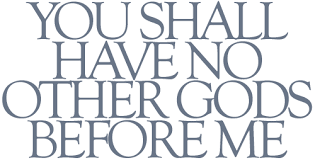
Exodus 20:23 Only God is God. Jesus Christ alone is the measure of all things. To make anything less than Him into an absolute, into a “god”, is idolatry.
Therefore, for the sake of your soul, do not give yourself totally to any political leader or party or social movement. One can think of many instances in history where political leaders – Caesar, Stalin, Hitler and others – expected unquestioning obedience. Or the corollary: during modern American election campaigns (which are now continual), political parties try to pretend they represent complete goodness, and turn their opponents into absolute evil. Do not fall into this – tempting though it may be sometimes.
“Give to Caesar what is Caesar’s.” Mark 12:17 In Romans 13, Saint Paul wrote: “Let every soul be subject to the governing authorities” – but this, remember, was written at a time when Christians were disobeying Governor Pontius Pilate and King Herod and the Emperor! How to work this out is sometimes complex, for above all we must “give to God what is God’s”.
C.S. Lewis said it best: “A man may have to die for his country *, but no man must, in an exclusive sense, live for his country. He who surrenders himself without reservation to the temporal claims of a nation, or a party, or a class is rendering to Caesar that which, of all things, most emphatically belongs to God himself.” The Weight of Glory
- Lewis served in battle in France during World War I.
4. How do we Orthodox know which politicians or political parties to support?
Some authorities in some denominations tell their people who to vote for – or at least strongly suggest it. Some even have denied the Eucharist to those who don’t follow their directions.
However, the Orthodox Church does not tell us how to vote, or precisely how to apply Orthodox principles to politics or legislation. And any Orthodox bishop, priest or theologian who does so is speaking out of line. If I’m correct our Bishops, in their encyclicals and statements, are very careful to take stands on social issues (sexual immorality, racial injustice, etc.) without advocating specific legislation.
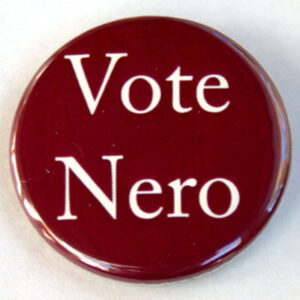 I suspect this is because Orthodoxy takes authority strictly from the Holy Scriptures, the Fathers and the Councils – and in those days people didn’t get a chance to vote for their leaders. No “Vote for Pontius Pilate” or “Nero for Emperor” signs. Left: somebody imagined this silly idea before I did!
I suspect this is because Orthodoxy takes authority strictly from the Holy Scriptures, the Fathers and the Councils – and in those days people didn’t get a chance to vote for their leaders. No “Vote for Pontius Pilate” or “Nero for Emperor” signs. Left: somebody imagined this silly idea before I did!
But today many of us have the privilege of voting, so we need to take our Orthodox social and moral teachings and try to apply them to politics. How to do this is up to each of us.
Should Orthodox social concerns 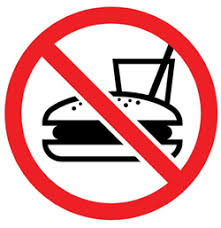 be made into laws? To be absurd again, I don’t think we want Congress to pass a law enforcing the Lenten Fast! or outlawing gluttony or anger or even adultery. So where do we draw the line here? Which is more effective – laws or personal freedom and responsibility?
be made into laws? To be absurd again, I don’t think we want Congress to pass a law enforcing the Lenten Fast! or outlawing gluttony or anger or even adultery. So where do we draw the line here? Which is more effective – laws or personal freedom and responsibility?
Again think for yourself. But never think by yourself.
Since no political party or politician in our secularized society will completely reflect the wide range of Orthodox social teachings, we must select whichever seems to us to be least “off the mark”. If you always find this easy and simple and obvious, may I humbly suggest that you may be doing something wrong.
5. What are Orthodox priorities in political leaders?
If the Church doesn’t give us directions about modern politics…
Jesus Christ, the Scriptures and the Fathers do speak clearly about personal morality and character.
 Here is an oft-quoted summary: “The fruits of the Spirit are love, joy, peace, patience, kindness, goodness, faithfulness, gentleness and self-control” – as opposed the “acts of the flesh: sexual immorality, impurity and debauchery; idolatry and witchcraft; hatred, discord, jealousy, fits of rage, selfish ambition, dissensions, factions and envy; drunkenness, orgies, and the like.” Galatians 5:19-23
Here is an oft-quoted summary: “The fruits of the Spirit are love, joy, peace, patience, kindness, goodness, faithfulness, gentleness and self-control” – as opposed the “acts of the flesh: sexual immorality, impurity and debauchery; idolatry and witchcraft; hatred, discord, jealousy, fits of rage, selfish ambition, dissensions, factions and envy; drunkenness, orgies, and the like.” Galatians 5:19-23
These virtues are especially important for parents, because young people usually “absorb” and follow and reflect their parents’ behavior and values. Surely these virtues are what we Orthodox want for ourselves and our children.
For the same reason we hope to find these characteristics in sports figures and entertainers who greatly influence culture.
Should we expect the same of Christian political leaders? Of course. They’re Christians. And society usually tends to take on their character and values. Surely these virtues are what we want for society.
We need to remember that some who are not practicing Christians (or even Christians at all) may have better moral character than than some who are. Abraham Lincoln, for example, never belonged to a church. This is because the Holy Spirit of God fills all the world. Likewise I remember churchgoing Christians who were ready to fight almost to the death rather than let a black man into their church.
Also wouldn’t we naturally want parents and political leaders also to fulfill this central moral  demand of Christ: “For I was hungry and you gave me something to eat, I was thirsty and you gave me something to drink, I was a stranger and you took me in, I needed clothes and you clothed me, I was sick and you looked after me, I was in prison and you came to visit me… Inasmuch as you have done it to the least of my brethren you did it to me”. Matthew 25:31-46 Whatever our politicians’ specific policies, wouldn’t we Christians expect them to take the lead in this?
demand of Christ: “For I was hungry and you gave me something to eat, I was thirsty and you gave me something to drink, I was a stranger and you took me in, I needed clothes and you clothed me, I was sick and you looked after me, I was in prison and you came to visit me… Inasmuch as you have done it to the least of my brethren you did it to me”. Matthew 25:31-46 Whatever our politicians’ specific policies, wouldn’t we Christians expect them to take the lead in this?
Should we Orthodox also want our political leaders to be practicing Orthodox Christians who worship regularly? Of course. That’s another way we can influence society. Maybe someday.
So again, never be just one of the sheep. Use your grey cells.
Now to a different issue:
How to talk about Politics.
1. Be responsible.
Let’s begin not with political discussion (which we’ll come to) but with the social media.
First, please be very careful about what you see. On Facebook individuals are supposed to be personally accountable by name for what they post, and most are. However we now know that many political postings on Facebook are from non-existent individuals and groups which are just “fronts” for some, both domestic and foreign, which push propaganda and lies designed to get people all riled up. Don’t fall for it.
Be equally careful about what you write on social media, which allow people to post anonymously, so they can say angry irresponsible nasty often inaccurate things they wouldn’t dare say face to face. Many comments posted after newspaper articles are the same. Personally I don’t do social media – I found it consumed too much of my time. But once I responded to an article (on one of the few topics I know a lot about) which contained much false information. I have never in my life been called so many names. Never again.
2. How to discuss politics with people face to face
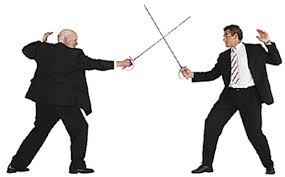 We Americans today are so divided along political lines that it’s hard to do this at all. My immediate family is united politically, and sometimes our conversations consist of getting all riled up that way – not healthy. But on Thanksgiving, when more distant family are gathered in, we have made a mutual pact to stay off the subject of politics – for these are good people, and there is so much else to talk about, and there’s no use in everybody stamping off mad.
We Americans today are so divided along political lines that it’s hard to do this at all. My immediate family is united politically, and sometimes our conversations consist of getting all riled up that way – not healthy. But on Thanksgiving, when more distant family are gathered in, we have made a mutual pact to stay off the subject of politics – for these are good people, and there is so much else to talk about, and there’s no use in everybody stamping off mad.
The problem these days is that, even if we can talk polticis without getting angry, we seem so often to be just talking past each other, as if in different languages. I don’t get it. I’ve never seen anything iike it in my long years, and if it becomes worse I fear what it’s all going to come to.
But if you’re brave enough to try to talk politics, I think this is how we should approach it.
1 Listen much more than you talk. (Old saying: each of us has two ears and one mouth for a reason.) Really try to hear where the other person is coming from.
2 Ask honest questions of the other person – in a sincere way, not provocatively, not designed to score points.
3 If the other person is starting to get angry: Stop talking. Now! Sit on it. Keep your mouth shut.
4 If you are about to lose control and speak in anger: Go home. “For the wrath of man does not produce the righteousness of God.” James 1:20
Here’s a good example of how politics should be discussed. This was “back in the old days” (the old man said again) when times were less excited than they are now. There were two men who often discussed politics at our Saint Nicholas post-liturgical coffee hour. One was an old Milwaukee socialist, the other far to the other side of the political spectrum. They would occasionally really get into it. But when they were done, they got up, smiled, shook hands, and said. “Have a good week. See you next Sunday.” Like that. If you can do that, God bless you and good luck.
That’s how many of our political leaders once handled it and thus set the pattern for the rest of us. In the early 1980s President Ronald Reagan, a very conservative Republican, 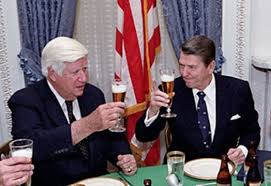 and Speaker of the House “Tip” O’Neill, a very liberal Democrat, were friends. They went to ball games together. Together they took their wives to the theater. And when they had a political issue they couldn’t resolve, they sat down, had a couple of beers and worked it out.
and Speaker of the House “Tip” O’Neill, a very liberal Democrat, were friends. They went to ball games together. Together they took their wives to the theater. And when they had a political issue they couldn’t resolve, they sat down, had a couple of beers and worked it out.
And all who watched them learned how to do it right. Back in the old days.
May those days come again. Please, dear God.
Next Week: The Lukan Jump
Week after next: A Deacon who couldn’t sing, and a Saint who was a fool

No “hot water” at all with this post! Many thanks for this helpful article, Father Bill. There has been a lot of hypocrisy of late (in the past four years at a minimum) in terms of what people/voters claim they stand for in terms of their Christian briefs and particular candidates they support who appear to be the exact opposite of said beliefs. It is both troubling and, well, strange to me, in terms of how far we have all fallen from “the good ole days” (as you say). My rule of thumb is this: after careful prayer and discernment, and (ideally) discussions with my priest and peers, which candidate is basically “pro-Gospel” to me and which is the embodiment of “anti-Gospel”? That plays a large role in my decision.
Again, many thanks for your healing and wise words. Blessings!
This is a very interesting article.
Are you suggesting that Abraham Lincoln, who unleashed a war that killed the equivalent of 15 million people (if the population of America in 1861 was equivalent to our own today) was a man of Outstanding moral character?
I’m sorry. I had just read that Lincoln is generally considered the most admired American president. But my point was only that you don’t have to be a practicing Christians to possess these virtues. Please substitute another non-Christian whom you think is virtuous, if you wish.
Nice spin John. You might want to read your history books.
One additional suggestion – while perhaps Tip O’Neil and Ronald Reagan could hash things out over a couple of beers, sometimes the libations should be curtailed instead for others. Some years ago, at a Christmas party I had worked very long and hard at preparing, a relative well known for both the vehemence and extremity of their opinions (though not their consistency!), and their fondness for conspiracy theories, had in short order consumed far too much, then dove headlong into their then-current hobby horse. I tried several times to derail them (for I knew where it would lead, as others there could not resist either baiting or correcting, depending on their positions), then directly told them to stop, then directly barked out to stop (I had lost my own temper at this point, and what they were saying I did not want my children, then quite young, to hear). They immediately departed with their entire family (effectively bringing the entire gathering to an abrupt end) and remained bitterly angry at me for a long time.
Since then my wife and I have consciously tried to limit the availability of alcohol at extended family gatherings because of both this and similar events. Some people cannot remain civil either in tongue, or in what they hear, once they have had too much. I have also made it very clear that at extended family gatherings politics cannot be discussed beyond certain bounds.
My sympathies, Skip. I should have been more cautious about alcohol in what I said. Are your family gatherings now more under control? I’m curious: What are the “certain bounds” you set for political discussion?
They have been more under control since – partly by enlisting the spouses of those who tend to get riled up to help act as a check, and partly by just informing everyone as politely as I can to avoid politics when certain mixes of people are present. The Christmas incident was sufficiently memorable that all involved now wish to avoid a repeat.
God bless you for taking control, instead of just enduring it.
The politics of O’Niel and Regan was still fundamentally “the art of the possible” to the “winning” for one’s favorite ideology. Politics is now a blood sport. All ideologies are lies and tend to become the god of those who champion. In effect what we are seeing in the US is a religious war.
In such wars only the evil one wins.
To fight or not to fight and how becomes the question. So the Orthodox outlook on war becomes significant.
The one constant in our varying approaches is the centrality of repentance because any choice I make will be colored by sin. There is no way to avoid it.
However, given some of the public statements of the leaders of one prominent adversary group–they are willingly and consciously evoking the demonic. That fact alone makes the choice of side much easier but it does not make the choice of how to fight much easier.
Thank you, Michael. Well said.
Perhaps I’m too naive for this present time, but I still think the way to fight lies is with truth, the way to fight unfaithfulness is with faithfulness, the way to fight dishonesty is with honesty, the way to fight indecency is with decency, the way to fight lawlessness is with lawfulness, the way to fight people breaking their word is by keeping one’s own word, the way to fight hatred is with love. Otherwise, everybody loses.
Father, yes but how one does that in my own heart is quite different in actual war than it is in civil politics. In war there is always the possibility that I will have to take physical action that hurts or kills someone else. There are examples of how to do that within the Orthodox tradition that is found no where else. Unfortunately I just know they exist but little else. I think the core of it is seeing who the real enemy is — the father of lies and deception and the passions it places in our hearts.
The principles you enumerate are taken to a deeper level to a deeper dimension.
I’m no expert here, only a long time observer. I remember World War 2, the Korean War, the Cold War, the Viet Nam War, the Iraq War – and I won’t mention current American politics. I think aggression (whether military, political, economic, religious) must be stopped, lest the norms of civilized society be corrupted or destroyed. However (this is attributed to several sources) “the first casualty of war is the truth”. Aggressors gain power by distorting the truth. And when it results in war, then people on both sides are prepared to believe the worst of “the enemy”, no matter whether it’s true or not.